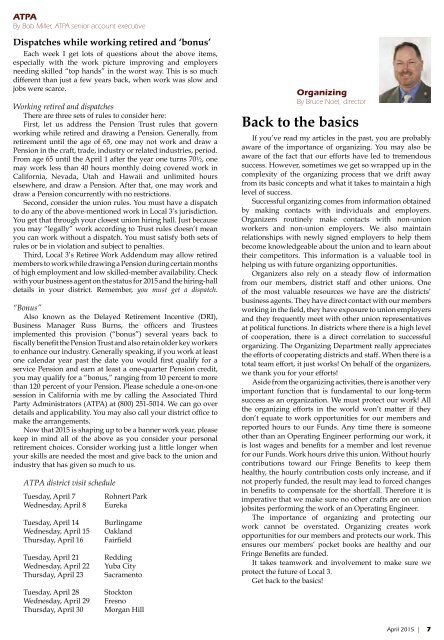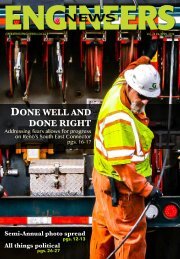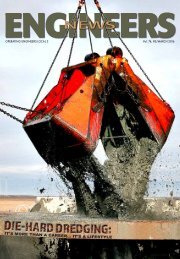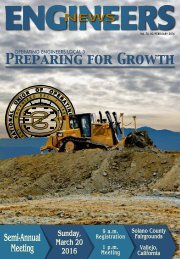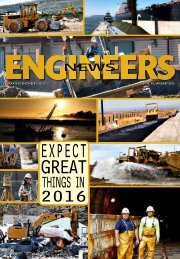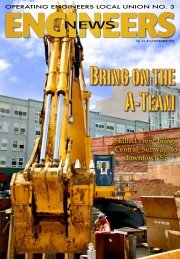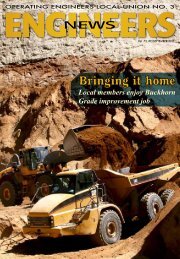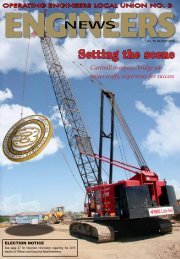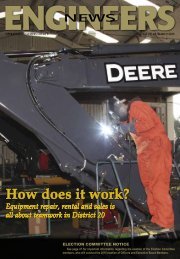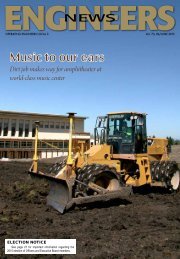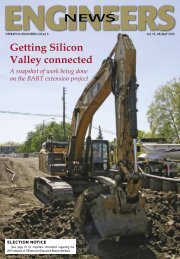Engineers News - April 2015
April 2015: San Francisco Proud - Work on high-profile Transbay Transit Center continues
April 2015: San Francisco Proud - Work on high-profile Transbay Transit Center continues
Create successful ePaper yourself
Turn your PDF publications into a flip-book with our unique Google optimized e-Paper software.
ATPA<br />
By Bob Miller, ATPA senior account executive<br />
Dispatches while working retired and ‘bonus’<br />
Each week I get lots of questions about the above items,<br />
especially with the work picture improving and employers<br />
needing skilled “top hands” in the worst way. This is so much<br />
different than just a few years back, when work was slow and<br />
jobs were scarce.<br />
Working retired and dispatches<br />
There are three sets of rules to consider here:<br />
First, let us address the Pension Trust rules that govern<br />
working while retired and drawing a Pension. Generally, from<br />
retirement until the age of 65, one may not work and draw a<br />
Pension in the craft, trade, industry or related industries, period.<br />
From age 65 until the <strong>April</strong> 1 after the year one turns 70½, one<br />
may work less than 40 hours monthly doing covered work in<br />
California, Nevada, Utah and Hawaii and unlimited hours<br />
elsewhere, and draw a Pension. After that, one may work and<br />
draw a Pension concurrently with no restrictions.<br />
Second, consider the union rules. You must have a dispatch<br />
to do any of the above-mentioned work in Local 3’s jurisdiction.<br />
You get that through your closest union hiring hall. Just because<br />
you may “legally” work according to Trust rules doesn’t mean<br />
you can work without a dispatch. You must satisfy both sets of<br />
rules or be in violation and subject to penalties.<br />
Third, Local 3’s Retiree Work Addendum may allow retired<br />
members to work while drawing a Pension during certain months<br />
of high employment and low skilled-member availability. Check<br />
with your business agent on the status for <strong>2015</strong> and the hiring-hall<br />
details in your district. Remember, you must get a dispatch.<br />
“Bonus”<br />
Also known as the Delayed Retirement Incentive (DRI),<br />
Business Manager Russ Burns, the officers and Trustees<br />
implemented this provision (“bonus”) several years back to<br />
fiscally benefit the Pension Trust and also retain older key workers<br />
to enhance our industry. Generally speaking, if you work at least<br />
one calendar year past the date you would first qualify for a<br />
service Pension and earn at least a one-quarter Pension credit,<br />
you may qualify for a “bonus,” ranging from 10 percent to more<br />
than 120 percent of your Pension. Please schedule a one-on-one<br />
session in California with me by calling the Associated Third<br />
Party Administrators (ATPA) at (800) 251-5014. We can go over<br />
details and applicability. You may also call your district office to<br />
make the arrangements.<br />
Now that <strong>2015</strong> is shaping up to be a banner work year, please<br />
keep in mind all of the above as you consider your personal<br />
retirement choices. Consider working just a little longer when<br />
your skills are needed the most and give back to the union and<br />
industry that has given so much to us.<br />
ATPA district visit schedule<br />
Tuesday, <strong>April</strong> 7<br />
Wednesday, <strong>April</strong> 8<br />
Tuesday, <strong>April</strong> 14<br />
Wednesday, <strong>April</strong> 15<br />
Thursday, <strong>April</strong> 16<br />
Tuesday, <strong>April</strong> 21<br />
Wednesday, <strong>April</strong> 22<br />
Thursday, <strong>April</strong> 23<br />
Tuesday, <strong>April</strong> 28<br />
Wednesday, <strong>April</strong> 29<br />
Thursday, <strong>April</strong> 30<br />
Rohnert Park<br />
Eureka<br />
Burlingame<br />
Oakland<br />
Fairfield<br />
Redding<br />
Yuba City<br />
Sacramento<br />
Stockton<br />
Fresno<br />
Morgan Hill<br />
Organizing<br />
By Bruce Noel, director<br />
Back to the basics<br />
If you’ve read my articles in the past, you are probably<br />
aware of the importance of organizing. You may also be<br />
aware of the fact that our efforts have led to tremendous<br />
success. However, sometimes we get so wrapped up in the<br />
complexity of the organizing process that we drift away<br />
from its basic concepts and what it takes to maintain a high<br />
level of success.<br />
Successful organizing comes from information obtained<br />
by making contacts with individuals and employers.<br />
Organizers routinely make contacts with non-union<br />
workers and non-union employers. We also maintain<br />
relationships with newly signed employers to help them<br />
become knowledgeable about the union and to learn about<br />
their competitors. This information is a valuable tool in<br />
helping us with future organizing opportunities.<br />
Organizers also rely on a steady flow of information<br />
from our members, district staff and other unions. One<br />
of the most valuable resources we have are the districts’<br />
business agents. They have direct contact with our members<br />
working in the field, they have exposure to union employers<br />
and they frequently meet with other union representatives<br />
at political functions. In districts where there is a high level<br />
of cooperation, there is a direct correlation to successful<br />
organizing. The Organizing Department really appreciates<br />
the efforts of cooperating districts and staff. When there is a<br />
total team effort, it just works! On behalf of the organizers,<br />
we thank you for your efforts!<br />
Aside from the organizing activities, there is another very<br />
important function that is fundamental to our long-term<br />
success as an organization. We must protect our work! All<br />
the organizing efforts in the world won’t matter if they<br />
don’t equate to work opportunities for our members and<br />
reported hours to our Funds. Any time there is someone<br />
other than an Operating Engineer performing our work, it<br />
is lost wages and benefits for a member and lost revenue<br />
for our Funds. Work hours drive this union. Without hourly<br />
contributions toward our Fringe Benefits to keep them<br />
healthy, the hourly contribution costs only increase, and if<br />
not properly funded, the result may lead to forced changes<br />
in benefits to compensate for the shortfall. Therefore it is<br />
imperative that we make sure no other crafts are on union<br />
jobsites performing the work of an Operating Engineer.<br />
The importance of organizing and protecting our<br />
work cannot be overstated. Organizing creates work<br />
opportunities for our members and protects our work. This<br />
ensures our members’ pocket books are healthy and our<br />
Fringe Benefits are funded.<br />
It takes teamwork and involvement to make sure we<br />
protect the future of Local 3.<br />
Get back to the basics!<br />
<strong>April</strong> <strong>2015</strong> |<br />
7


